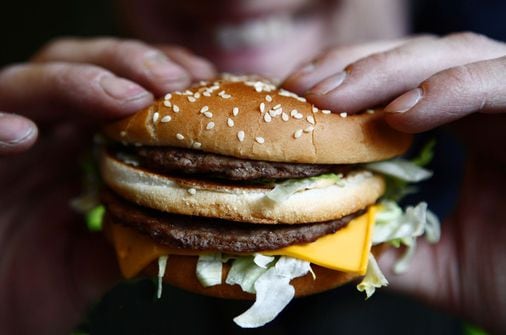The economics of fast-food restaurants are a dark hole — the further you travel the darker it gets. From the farms and slaughterhouses where animals are processed, to the fields where tomatoes and other produce are grown, to the counters where minimum wage workers sell the end product — abuse, exploitation, and toxicity are rampant. In mega-meat processing plants throughout the country, barely living cows, pumped with drugs to keep them upright, are electrically prodded toward the conveyor belt for processing . Treatment of migrant workers in Florida and elsewhere by the main produce suppliers to the fast-food industry was called “modern day slavery” by the federal government, resulting in prosecutions and arrests. And in the restaurants themselves, minimum wage workers, often without benefits, earn less pay than what is needed to support an individual, much less a family. That is why fast food should cost more.
Returning from a recent trip, I stumbled on a rest stop with the most expensive McDonald’s in America. There, I joined stunned visitors staring agog at the menu board and its pricing. Sticker shock isn’t something one equates with fast-food restaurants, but the prices here were hard to believe — a Big Mac meal was more than $19. My conclusion? This is what fast food should cost.
The issues with the industry are well-documented in the pages of “Fast Food Nation” by Eric Schlosser. The book has been compared to Upton Sinclair’s “The Jungle,” a devastating chronicle of the meat-packing industry written in the early 1900s. What is startling in comparing the two works is how little the industry has changed some 100 years later.
What is new, however, and what should bring fundamental changes to the industry, are a trinity of converging developments: consumer action, low unemployment, and recent minimum wage fights across the country.
Advertisement
Consumer action has shown up in such forms as the farm-to-table movement, driven by people like Schlosser and Michael Pollan, author of “The Omnivore’s Dilemma,” who together are part of the Food, Inc. documentaries. Here, we see customers voting with their feet by avoiding foods that are treated with pesticides and hormones that are bad for humans and the environment. It’s why organic food sales are rising in the United States and will likely continue to grow. The downside is that healthy meals are more expensive than fast food.
Low unemployment is driving hourly wages for fast-food workers to levels never before seen; in some cases those wages are higher than salaried professions such as teachers and nurses. While that in itself is a tragic commentary on our value of these professions, the trend of paying workers more, according to Schlosser, is the most important change that can be made.
“The most important thing I would change is wages across this economy — that’s number one,” Schlosser told me. That includes workers in the farms, fields, and processing plants, like those that form the Coalition of Immokalee Workers, who were able to bring a one penny per pound increase for tomatoes, allowing the doubling of wages and an end to the abuses faced by these workers. Here, the fast-food industry has cooperated. Only Wendy’s and its billionaire chairman Nelson Peltz refused to participate.
“That’s what’s wrong with America,” Schlosser said.
Advertisement
Low unemployment is unfortunately a temporary economic condition.“As the unemployment rates slowly rise, wage growth will slow and in many cases revert to their allowable minimum. Enter Fight for a Union and other campaigns across the country to bring minimum wages to a level that can allow the lowest paid workers to survive. Here in Boston, Harris Gruman of the SEIU is working to bring minimum wages to $20 an hour, having already successfully raised the rate to $15 in 2018. Now, six years later, given inflation, the cost of housing, and other price escalators rising, he calls $20 a “bare minimum.”
Where does this leave the $19 Big Mac meal? Not expensive enough.
Given the costs to society — the antibiotic pathogens resulting from factory farms; the poisoning of land, animals, and people; the costs to the health care industry and the social safety net — the costs aren’t high at all.
“When you add up the real costs of this food,” Schlosser said, “maybe that McDonald’s hamburger should be $30.”
In other words, he said, “fast food should be expensive and healthy food should be inexpensive.”
That makes the recent effort to raise the minimum wage here in Massachusetts, and other efforts across the country, essential. When combined with the changing demands of the consumer, the excesses chronicled in “Fast Food Nation” and even still “The Jungle” should one day be ancient history.
Mike Ross is an attorney at the law firm of Prince Lobel.




